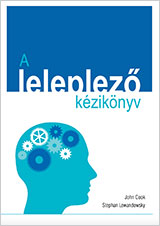Hungarian translation of The Debunking Handbook
Posted on 14 April 2015 by Guest Author
This is a guest post by András G. Pintér who is the vice-president of the Hungarian Skeptic Society.
Thanks to the co-operation of a few enthusiastic people, The Debunking Handbook is now available in Hungarian. Although, the translation project was initiated by the Hungarian Skeptic Society about a year ago, the job itself was completed by a sup porter of our organization by the name Ilona L'Homme, leaving us with only some polishing work to do on the text before sending it back to author John Cook for the final touches on the design.
porter of our organization by the name Ilona L'Homme, leaving us with only some polishing work to do on the text before sending it back to author John Cook for the final touches on the design.
Many thanks to the authors and the translator who provided Hungarian skeptics with an important tool for the most difficult challenge we tend to take on: correcting erroneous beliefs and mindsets of other people.
Since it fits perfectly into our actions of skeptical activism (lectures, conventions, shows, blogs and social media presence), we are planning to spread the word and make this booklet known to as many people as possible within the Hungarian skeptical movement (and beyond).
It seems like a small thing to do, but far from it: it is a powerful tool, that's now within reach for even those who happen not to have a very strong conduct of English.
We could not be more grateful for this booklet. Let it be translated to all the languages, so that everyone has the chance to use it for the benefit of all.
Note to other translators:
If you'd like to translate the Debunking Handbook into another language, please download the two-column Word document which has the English text in one column and a blank column where you can add the translated text. Email the complete document back to us, and we'll insert it into the existing design. To ensure that no one else is already working on your language, please contact us first by selecting "Enquiry about translations" from the contact form's dropdown menu.
The Debunking Handbook has already been translated into Dutch, French, German, Italian, Polish, Spanish and Swedish.































 Arguments
Arguments






























It looks as "Hungarian skeptical movement" is the organisation like SkS team and most commenters who care about the accuracy of science and scientific communication.
On the other hand, in US for example, a similarly named "American skeptical movement" would likely be an organisation of deniers/science obfuscators.
Does it mean the meaning of the word "skeptic" has not been denigrated in Hungary and the hungarian "skeptics" (in american sense) are called properly "deniers"?